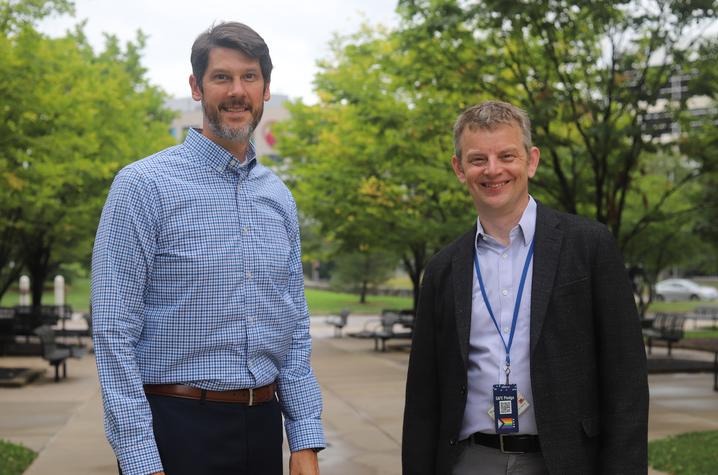$2.2 million NIH grant will allow UK team to optimize therapies for patients with heart failure

LEXINGTON, Ky. (Aug. 10, 2022) — Heart failure is prevalent across the Commonwealth and develops when a patient’s heart cannot deliver enough oxygen. The clinical teams at UK HealthCare provide world-class care to 40,000 patients with this condition each year.
Thanks to a recent four-year, $2.2 million National Institutes of Health (NIH) grant, a team of cardiologists, scientists and engineers at the University of Kentucky and beyond will create computer models that optimize the therapy plan for patients with heart failure.
“This is not about implementing a standard practice. This is about how we can push back the frontiers,” said Kenneth Campbell, Ph.D., professor of cardiovascular medicine at the UK College of Medicine and a co-principal investigator (PI) on the NIH grant.
Campbell said most patients with heart failure typically receive a standardized treatment that includes a beta blocker, an ACE inhibitor and perhaps an SGLT2 inhibitor. While studies show that these drugs help patients live longer, Campbell’s team members are combining biology, mathematics and engineering to develop personalized therapies that will improve care.
They will do so by building computer models of the heart, that grow and evolve over time and which can be used to test which combination of potential therapies works best for each patient.
“Our idea is to create computer models that are tailored to each patient,” Campbell said. “The doctor will press a button, and a couple of hours later, get a prediction that their patient will do best with this particular set of drugs and surgical interventions. That combination will be different for you. It’ll be different for me. It’ll be different for each person.”
Campbell’s primary expertise is on the molecules of the heart. The UK College of Medicine’s Alliance Research Initiative helped him forge connections with experts in cardiology and mechanical engineering to catalyze progress.
Partners on this grant-funded project include Emma Birks, M.D., Ph.D., professor of medicine at UK College of Medicine, and Gaurang Vaidya, M.D., assistant professor at UK College of Medicine; co-PI Jonathan Wenk, Ph.D., Gill associate professor at UK College of Engineering; and co-PI Lik Chuan Lee, associate professor of mechanical engineering at Michigan State University.
While Birks and Vaidya provide clinical expertise in heart failure, Wenk and Lee are leaders in computer modeling of beating hearts.
Along with promoting scientific discovery, the NIH grant will fund postdoctoral fellows and provide new learning opportunities for undergraduate, graduate and doctoral students.
“In 10 years’ time, cardiologists won’t have to give everybody the same standard therapies,” Campbell said. “They will use a computer to develop personalized treatment plans that will help each one of their patients to live better.”
Research reported in this publication was supported by the National Heart Lung and Blood Institute of the National Institutes of Health under Award Number R01HL163977. The content is solely the responsibility of the authors and does not necessarily represent the official views of the National Institutes of Health.
As the state’s flagship, land-grant institution, the University of Kentucky exists to advance the Commonwealth. We do that by preparing the next generation of leaders — placing students at the heart of everything we do — and transforming the lives of Kentuckians through education, research and creative work, service and health care. We pride ourselves on being a catalyst for breakthroughs and a force for healing, a place where ingenuity unfolds. It's all made possible by our people — visionaries, disruptors and pioneers — who make up 200 academic programs, a $476.5 million research and development enterprise and a world-class medical center, all on one campus.




